#which illustrates part of my discomfort here
Note
Hey, I don't want to come off as whiney or like you did some horrible evil bc you didn't, but can you tag imaged depicting self harm? I really like your account, and I would love to keep fallowing you, but yeah...
Hope you have a good night !
i appreciate that you're asking this so nicely. i also think that my tumblr might just not be for you—i understand wanting a tag for this, but i haven't felt comfortable tagging it, because i can neither adjudicate what "counts" as "self-harm" nor do i want to be applying the term as an external observer to instances where it may not be thought of in this way by the subject. i think that to a large extent the conceptual boundaries of "self-harm" are political and far more informed by notions of health and productivity than they are by concerns for agency and autonomy. it's something i have strong feelings and thoughts about as someone who likes my own scars. i certainly cannot tag them offline. hope you have a nice night as well 🐐
#ask answer#mind you the post i am pretty sure precipitated this did not even feature self harm but just scars broadly#which illustrates part of my discomfort here
18 notes
·
View notes
Text
Does Izuku Think His Feelings For Katsuki Are Gross? (or, DvK2's Endless Emporium of Nuance)
This is a pretty common sentiment I see repeated, and we all know the source of it: Deku vs. Kacchan 2.
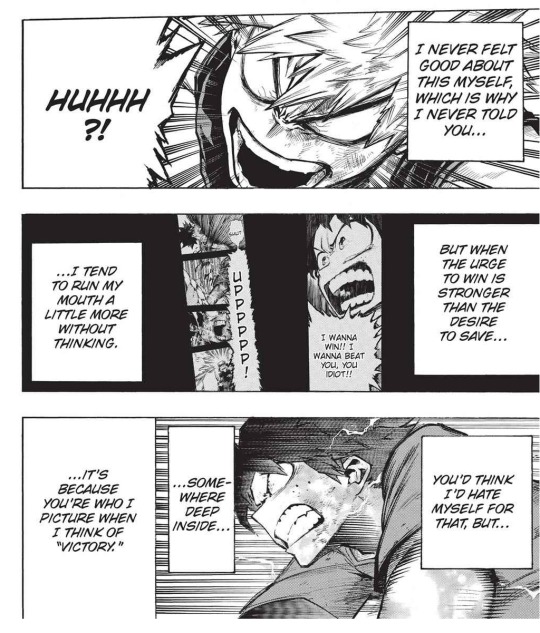
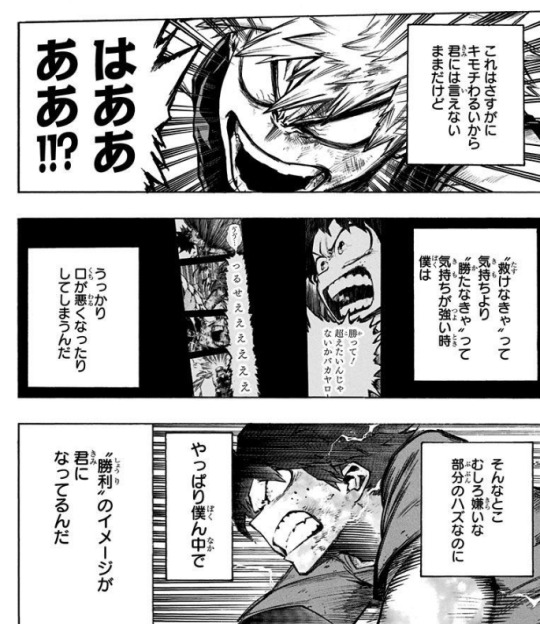
Original Japanese and official English translation.
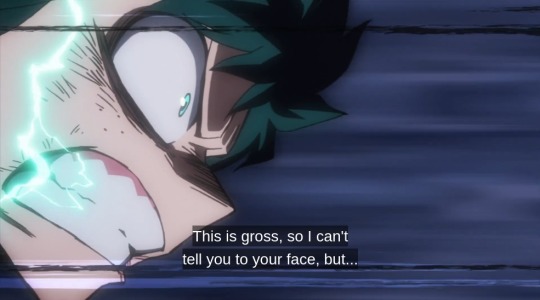
Crunchyroll subtitles
In one translation, Izuku expresses discomfort over this topic; in the other, he outright declares it to be gross.
That is quite the difference. I gotta say, Crunchyroll’s direct “This is gross” kind of shocks me, because it functionally ignores the key adverb “sasuga ni” and translates the line the same as you would if he hadn’t said it at all. The official manga translator, on the other hand, clearly made a decision about what Izuku meant by that phrase and then dispersed that meaning across the line as a whole.
So I understand why people have this straight-forward interpretation.
I’m here to offer some linguistic nuance, because my main problem with “Izuku thinks his feelings are gross” is not that it is completely wrong. It’s that it isn’t the whole story.
There are two really important phrases to take into account: kimi ni wa ienai and sasuga ni.
To illustrate their meaning, let’s split the line into two sections:
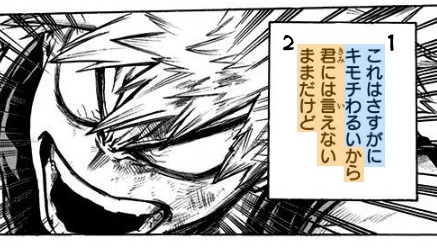
Note: Grammatically, kara belongs in the first section. I’m lumping it into the second section for the sake of isolating the core ideas expressed in the first section and maintaining clarity in the second.
Now we’re going to break the sections down into their constituent parts. This looks like a verbatim nightmare of a translation, because it is, but trust me, it’s a useful exercise.
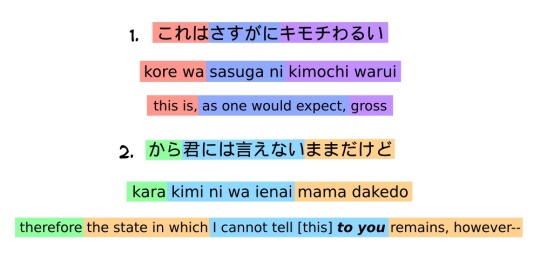
Kara links the two sections by showing that the first section directly causes the second. Something worth noting is that Izuku does not use past tense here—he uses present tense and indicates a continuous, unchanged state. He has not been able to before and still cannot tell this to Katsuki. I would argue this also suggests he thinks the circumstances will not change for the foreseeable future.
Important Phrase #1: kimi ni wa ienai
Ienai is the negative potential form of “to say,” which means it is not possible for him to say it. Iwanai, on the other hand, is the negative present tense, and if he had used iwanai instead, that might suggest that he has some choice in the matter. Examples in English might be, “That’s why I don’t tell you this,” “That’s why I’m not telling you this,” and “That’s why I haven’t told you this,” which all express intentional withholding despite opportunity. To use a form that specifically denies the possibility serves to center limitation, regardless of desire.
The combination of the two particles ni and wa are used to emphasize, compare, and contrast. This is extremely telling just on its own. Izuku is emphasizing the fact that, compared to everyone he could possibly tell, he cannot tell Katsuki this. He might be able to tell other people, but when it comes to Katsuki, he cannot. Ienai does not specify where the limitation stems from, but ni wa sure implies it.
Now let’s dig into the phrase that does the most heavy-lifting in the first section.
Important Phrase #2: sasuga ni
Sasuga ni is the adverb Izuku attaches to the adjective kimochi warui (gross or creepy). It is typically translated “as expected” because this kind of adverb sounds awkward in English. “This is expectedly gross” is not a sentence people say much. You might also see it translated “as I thought,” “naturally,” “obviously,” or “indeed.”
And there is something interesting here: Izuku uses a second word that means “as expected” on this page.
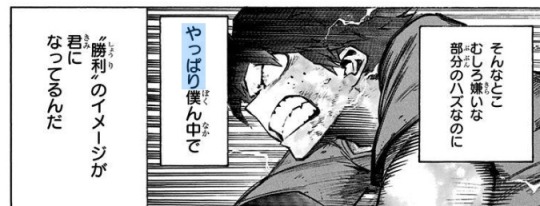
Yappari, which can also be translated as “in the end,” “sure enough,” or “after all is said and done.”
I researched the nuances of these two phrases, synthesizing definitions and examples from four different Japanese dictionaries/encyclopedias and two forum boards for language tutoring from native speakers. My conclusions as related to their usage here:
Yappari indicates:
an outcome that was expected (example: “I tried, but sure enough, I failed.”)
something that remains unchanged [in the state it was previously or in other circumstances]
a situation where, no matter how you think about it, you end up with the same result (example: “I was really torn over it, but in the end I gave up on going.”)
Sasuga ni indicates:
[you, the speaker] must acknowledge that this is the natural result of the situation up to this point (example: “they grew up in a big family, so naturally they are good with kids.”)
something exceeds the permissible range, or that it may be permissible under certain conditions, but not others (example: “no matter how nice a guy he is, if he was accused of something unfairly, he’s bound to get angry.”)
You can see the meanings overlap, but the sentiments are a bit different. I saw someone learning Japanese say that every time they used one of these phrases, native speakers told them they should have used the other one instead. Another learner responded that, from their observations, the distinction appeared to be that yappari is used when the speaker had personally thought about and expected this outcome, while sasuga ni suggests that everyone would agree with this statement.
I’m not sure this is true across the board; usage always varies, even among native speakers, so generalizations are only useful up to a point, but I have to admit, a bunch of little things I noticed in my research do support this line of thinking.
If yappari tends to be more reflective of the speaker’s personal thoughts and expectations, sasuga ni’s “acknowledgment of a natural result” could indeed imply external validation. This is true of the equivalent English words, at least: naturally and obviously both suggest that any reasonable person would accept it as fact.
In fact, permissible as an idea kind of hinges on social norms—what is reasonable for someone to put up with? What behaviors sit within the realms of welcome, allowable, or excusable based on your relationship?
In my opinion, Izuku feels like he cannot say this to Katsuki because it exceeds the bounds of what is permissible between them. If sasuga ni implies Izuku feels sure that anyone would agree with his assessment, Katsuki is absolutely included in that.
Izuku is not saying, “I alone think this is gross, so I can’t tell you.”
He is saying, “Considering everything that has happened between us up till now, you would obviously see this as gross, so I can’t tell you.” Its grossness is a natural result of the situation—their history, the way their relationship fell apart, the way Katsuki lashes out, how he can barely stand Izuku’s presence, let alone his emotional honesty.
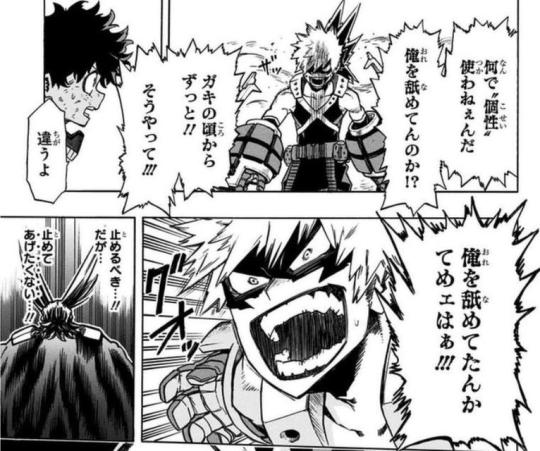
Chapter 10, during Deku vs. Kacchan 1
But remember that this sentence is a fragment: the subject of Izuku’s sentence is revealed in the second half, and it is the fact that he runs his mouth when he wants to win more than he wants to save.
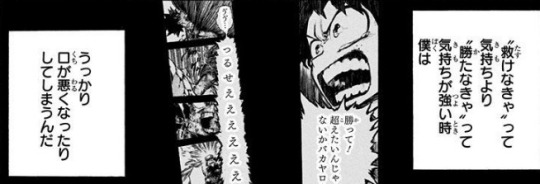
This is what is gross. Izuku acknowledges that the behavior itself is unpleasant, and that any reasonable person would agree with that. His whole identity as a hero is based on saving people, so he feels some real discomfort when he has to recognize that sometimes he just wants to win. In fact, he can want victory so much that it supersedes his desire to help people.
Izuku has intentionally emulated Katsuki’s practical tactics, but this is about instinctive response. He wasn’t standing there facing Muscular, thinking the winning move was definitely to scream, “shut up.” He was furious, so he wanted to win and make that guy shut up.
When the scale tips, he acts out. He talks shit. He screams at people and insults them, because that’s what Katsuki does. These are all unacceptable behaviors, socially-speaking. Katsuki constantly and intentionally acts the exact opposite of how he should to qualify as a Good Japanese Boy. Izuku, on the other hand, plays the part faithfully, at least until it demands he betray his core values.
Deku vs. Kacchan 2 showcases how neither Izuku nor Katsuki had fully accepted the heroism of their counterpart. Katsuki is uncomfortable with Izuku’s innate capacity to help others, to see their need and meet it without question. Izuku is uncomfortable with craving victory, with that indomitable drive to seek glory. They each admired All Might for the value they themselves embody, and they admired each other for the value they lacked, but that doesn’t mean their admiration was uncomplicated.
Katsuki is a loud-mouthed, aggressive jerk, but Izuku ends up acting just like him. He clearly feels conflicted about it. He’s annoyed and hurt that Katsuki pushed him away by being such a jerk in the first place. And, from his perspective, he fails every time he tries to wrangle their relationship into something less miserable. He might even be embarrassed over the simple fact that he has held on to these deep-seated emotions for years over someone who wants nothing to do with him. He wishes things were different. He doesn’t know how they could be, anymore. He wants to connect, but he can’t.
Izuku frames his inability to express this specific thought as natural and reasonable. Obviously, there’s no way I could do this. And honestly, he is probably right. After all, this is a very intimate, revealing thing to tell someone who seems to hate your guts and has for years.
At any other point in the story, Katsuki probably would have curled his lip in disgust and barked out Izuku’s exact words, “Gross.”
But in DvK2, Katsuki bears his heart to Izuku without restraint.
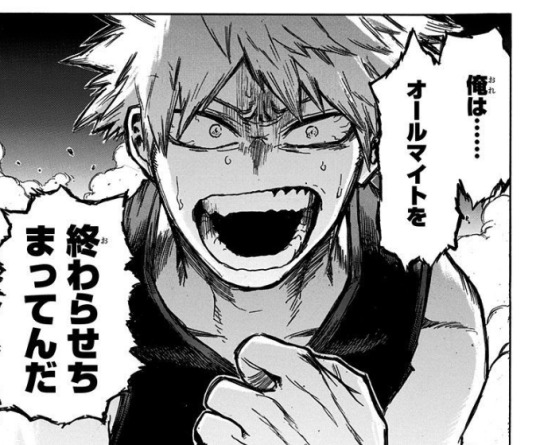
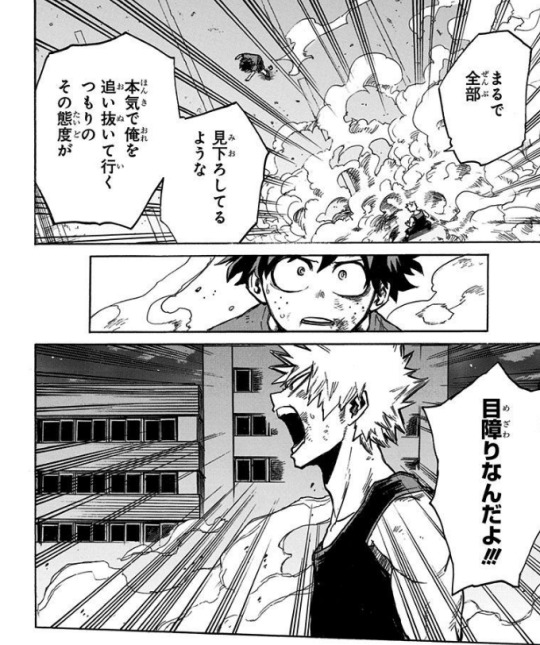

Katsuki confesses something painful and private to Izuku twice, at two separate moments.
Izuku has two confessions, too. Here's the first:
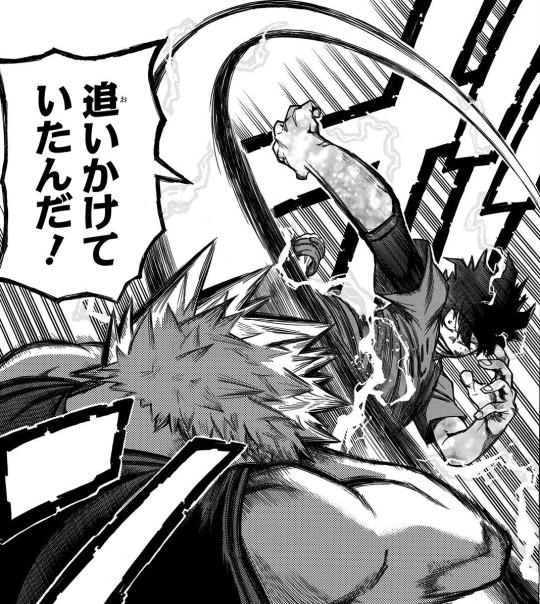
But the second he admits only to himself and the audience.
Maybe if Izuku had said his “image of victory” monologue out loud, Katsuki could have had his own moment of understanding:
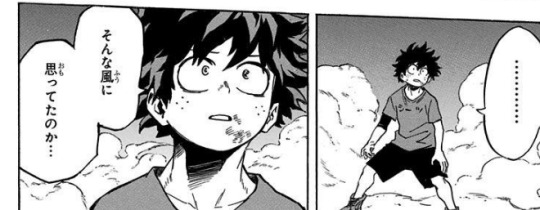
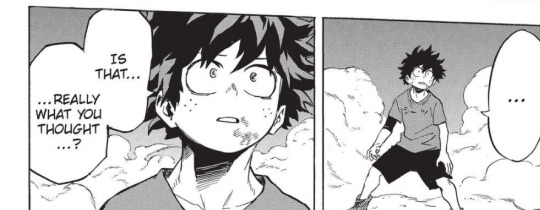
Izuku’s reaction after Katsuki’s second confession.
Maybe Katsuki wasn’t ready to hear it, or maybe Izuku was too chicken to believe he was ready. Either way, he needed to voice both confessions, and he didn’t.
So the narrative punishes Izuku for failing to push past his own limitations.
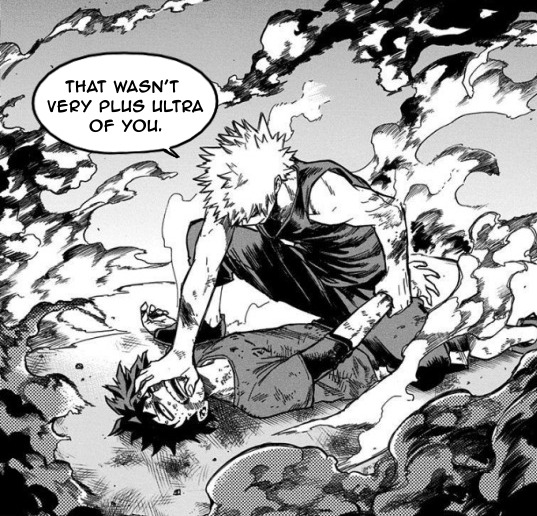
In the battle of revealing their honne—their true feelings, their truest selves—Katsuki risked it all.
Izuku couldn’t do the same, and that’s why he loses.
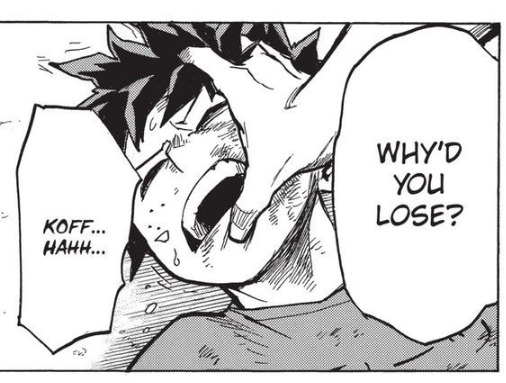
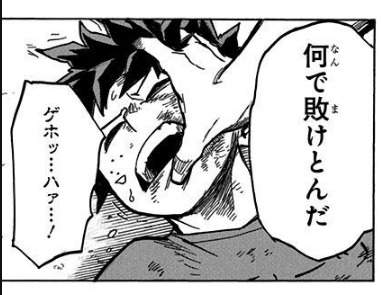
Don’t forget that underestimating your opponent is one of the easiest ways to lose a fight in MHA.
But I want to reiterate, Izuku feels conflicted about this behavior and his own feelings, not ashamed.
Emotional conflict is borne from two or more simultaneous, contradictory feelings. Izuku admits that any reasonable person would see the way he unconsciously imitates even Katsuki’s bad habits as gross, but he also clearly tells us something else.
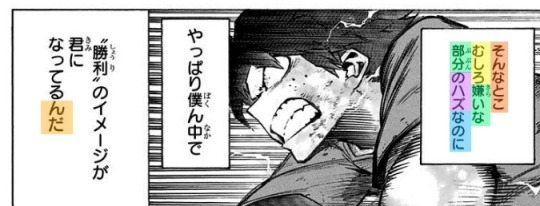

Izuku is directly expressing his own thoughts about it, and the most important phrase is nanoni, which according to online encyclopedia Kotobank, “indicates that the following is contradictory to the preceding matter” and specifically, “includes critical feelings about the contradiction between” those two things. The latter point is unique because other words often used for “but” (such as kedo, which he used earlier in the form of dakedo) do not necessarily do this.
In the final line, one little detail here is the orange highlighted nda. This is used to explain and correlate topics of discussion. The most obvious point of explanation is why he acts this way. But the use of nanoni to connect this thought to the previous one tells us that this line is also explaining why Izuku doesn’t hate it.
Katsuki is his image of victory, and that alone is the reason he does not find this part of himself unacceptable. Just like with sasuga ni, Izuku is telling us that he understands the way other people would see this situation, and he knows what he “should” feel, but then he tells us that he does not feel that way.
I know it is very easy to see “This is gross, so I can’t tell you” at the start of this monologue, skip right to “image of victory,” and walk away thinking that Izuku is ashamed of that specifically, but the details show that the opposite is true.
And let’s not forget the nuance of yappari, which implies that Izuku has personally thought about this fact over and over, but it has always been this way.
I have seen people say that Katsuki is the one letting Izuku set the pace of their new relationship and that Izuku holds back, with this presumed shame as the cause. But I don’t think that acknowledges Izuku’s perspective on their dynamic, nor the casual mutualism they build together.
Katsuki initiated DvK2: a unique, closed “event” wherein, for the first time, they each expressed their vulnerabilities as much as they were able. But immediately outside the confines of DvK2, Izuku is the one who reaches out, as a gesture of reciprocation towards Katsuki for having initiated this change.
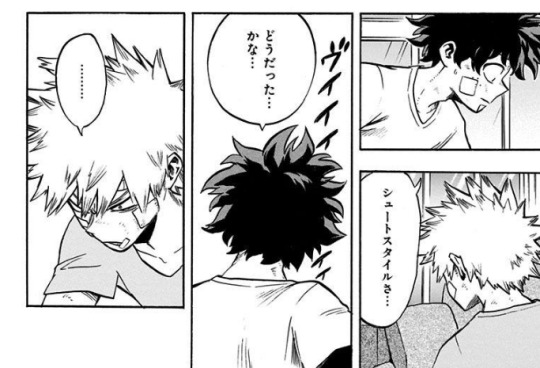
He is asking Katsuki's opinion, but what this gesture means is, “I don’t want us being honest with each other to end there. I still want you in my life.”
And maybe for the first time in years, Katsuki actually understands what Izuku means, and reaches back.
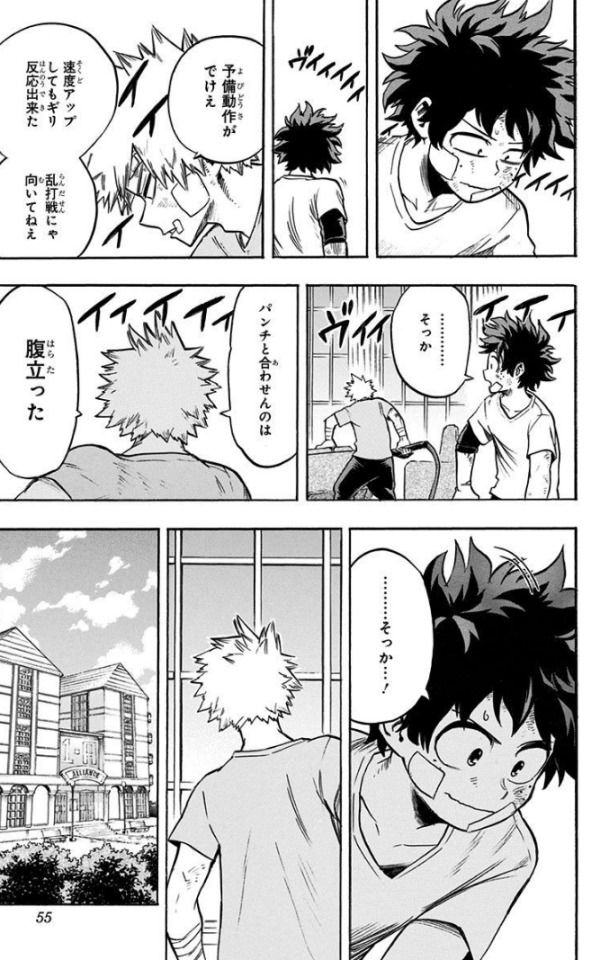
Look at these fucking nerds.
Notice that Izuku responds to Katsuki twice. At the first response, Katsuki has offered his observations and given him valid criticism on his technique, which is a show of goodwill. But then, Katsuki continues even when the admission reflects a personal weakness, with Izuku's punch having caught him off guard. This is actual honesty, and it means that they didn't just resolve their aggression and reset to neutral peers, but that Katsuki wants to be close, too. And just like during their fight, understanding comes the second time around.
I’ve said it before and I’ll say it again: from Izuku’s point of view, Katsuki’s shitty behavior was the only thing that stood between them, because Izuku’s core feelings for him never changed.
Izuku lets Katsuki decide what is permissible between them, because Katsuki is the one who pushed him away in the first place. He opens the door just enough to say, “Whatever you want to give of yourself, I will accept.”
After that, Katsuki is the one making the big gestures by taking time out of his own life to discuss OFA with Izuku and All Might and help Izuku by training with him, even inserting himself into situations when he isn't asked. At every point, we see Izuku receive Katsuki with warmth and then follow up with smaller gestures of his own.
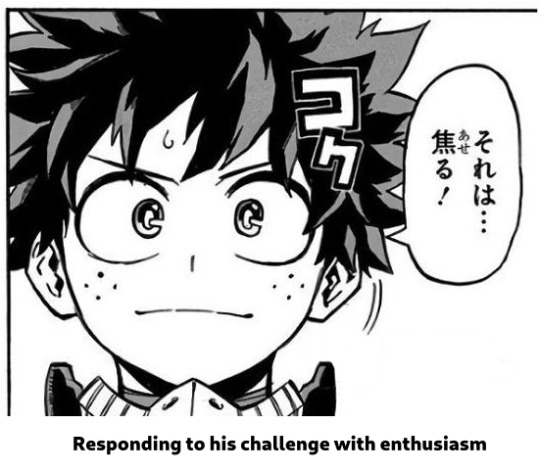
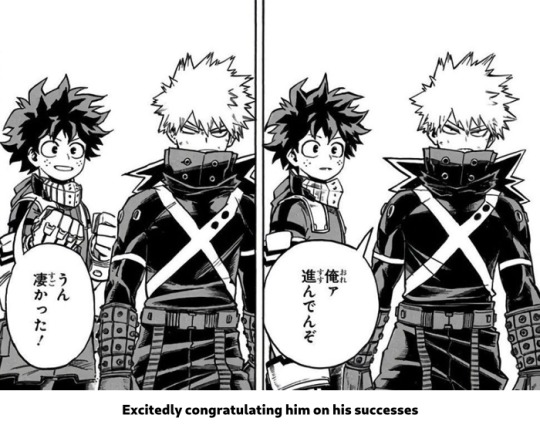
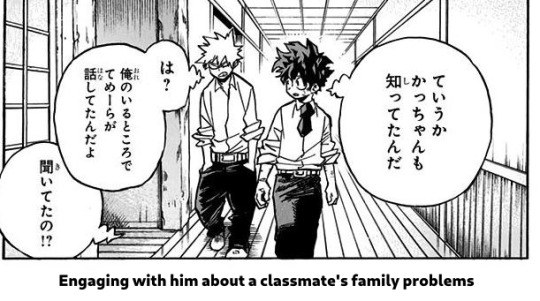
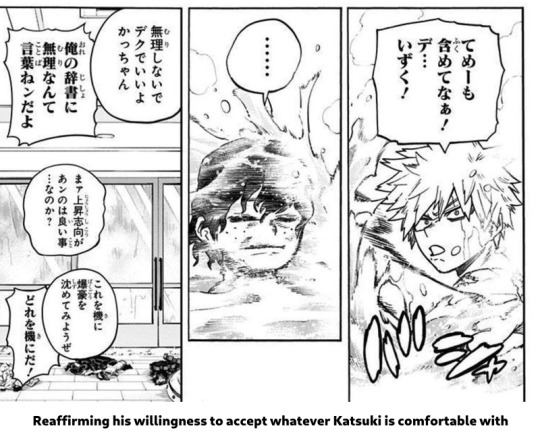
Chapters 202, 209, 249, and 327.
The reason we see so much of Katsuki’s side of their relationship, especially after DvK2, is because his feelings are the ones that change the most: from dysfunctional to self-aware and accepting. He has struggled for years over Izuku’s place in his life. He didn’t understand Izuku or his own feelings, and he was wrapped up in denial. He tells himself again and again that Izuku is “beneath him,” when we know the truth is he always thought Izuku was better than him.
Comparatively, Izuku resolves his conflicted feelings about his admiration for Katsuki much quicker, because the source of his conflict was primarily external while Katsuki's was primarily internal.
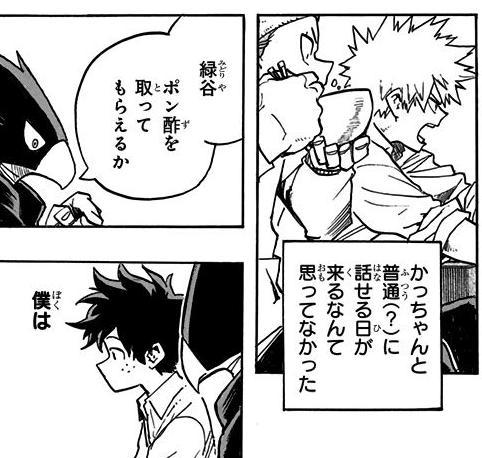

Chapter 257
A little detail I love about the "I'm too blessed" moment is that Izuku thinks of his conversations with Katsuki as "normal(?)" with a literal question mark attached. Is this normal? He doesn't really know. But it's enough. Kacchan is Kacchan, explosive and outrageous and way too much, all the time. Maybe they'll never be what other people think of as "normal," but Izuku is happy just to have Kacchan as he is, and be there however Kacchan will have him.
Katsuki's ideal has always been Izuku; he tried to outrun that fact and failed every time. Meanwhile, Izuku’s image of victory has always been Kacchan, and he has just been waiting for Kacchan to want to hear that from him.
Everyone has been wondering if Izuku will ever tell him. Me, personally, I'm hoping their story will end with a mutual declaration of their shared truth.
"You have always been my hero."
#bkdk#bakudeku#mha 10#mha 118#mha 119#mha 120#mha 121#mha 202#mha 209#mha 249#mha 257#mha 327#deku vs kacchan 2#meta#I hope you all appreciate the neurotic depths my research went to#never again shall I forget the difference between yappari and sasuga ni#I didn't mean to give a grand tour of Izuku being incredibly in love and receptive to whatever Kacchan wants to give him#it just happened!
789 notes
·
View notes
Note
which one’s toshiro and whys he autistic?
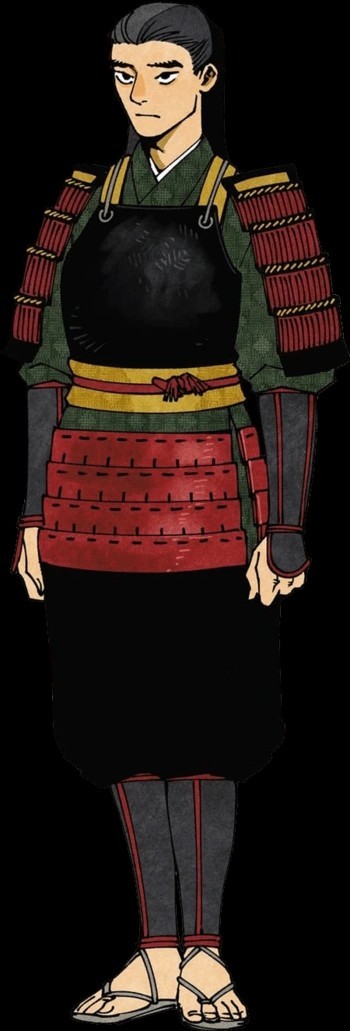
[ID: full body colored illustration of toshiro from the dungeon meshi manga. /End ID]
THIS FREAKIN GUY!!!! anyway
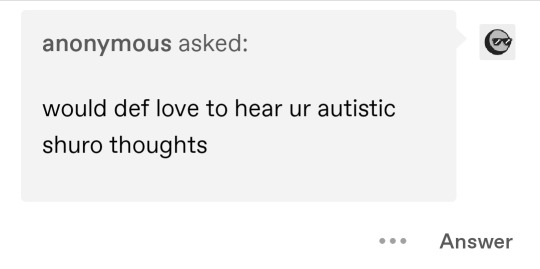
[ID: anonymous tumblr ask: "would def love to hear ur autistic shuro thoughts". /End ID]
awesome. rant under the cut because it will be long
So before we understand why Toshiro is the way he is we must first understand two things abt him:
1. his household situation is a very traditional clan of warriors type situation. his father is very strict and he left his homeland to go to the Island and explore the dungeon to train and become a warrior to be someone suited as the family head
2. Eastern and Western cultures of respect/propriety are different, and Ryoko Kui highlights it well even in her fantasy world.
With that in mind, heres some bullet point rapid fire thoughts that consume my current state of dunmeshi brain:
Toshiro has an avoidant personality. He fears upsetting others due to his upbringing, and rarely tells others how he feels not because he thinks they would simply understand him but because he doesn't want to seem rude and imposing / cause offense to others especially since he's not in his own homeland / hes a foreigner that should respect the land's customs, not his own wishes.
Setting boundaries is hard for everyone, but especially autistic (and some other ND, like those with Avoidant Personality Disorder) people. Those with ASD, at least in my experience, don't want to be isolated from others. So they mask.
They mask what? their desires. their true selves. their opinions. their discomfort. all for the sake of pleasing others (who are often neurotypical)
With that in mind, suddenly, what Maizuru said abt him as a child makes sense. Due to his strict upbringing, Toshiro had to more or less hide his preferences and force himself to adapt to the rigid constraints of his culture and the pressure to be the next family head, this responsibility is his burden to bear and he cannot be someone who expresses his selfish desires instead of focusing on being a strong warrior and leader
"Why did he say he hate Laios and that it should've been obvious that he disliked/found Laios' treatment of him uncomfortable??" BECAUSE IT SHOULD BE OBVIOUS. I'm not going to write off Laios' autism/autistic coding, but its baffling (note: definitely racism and bias for white autistic ppl) to me that a lot of ppl don't see Toshiro's perspective and straight up ignores it. This is a lack of wanting to be rude by speaking up that is based on culture difference on Toshiro's part, and straight up ignorant of his microagressions/racism and lack of self awareness on Laios' end. They were both right, they were both wrong too. This is a complicated conflict that cannot be boiled down to simple ableist/the NT vs ND divide. There's something called . intersectionality. Which brings me to the next point
Toshiro never actually hated Laios. He found him uncomfortable, yes. But he didn't /hate/ him, he was speaking out because he's had enough!!! he's done tolerating Laios' racist bullshit, and he's done following the arbitrary Eastern rules of respecting others and not being rude!!! He. Wants. Laios. To Understand. What. He. Was. Feeling. Because he just had enough!!!!! alright!!! he's at his limit hes at his breaking point, the one he loves is now probably beyond saving, and this is a good time as any to break the news to Laios that he thinks that Laios is impulsive and doesn't fully understand how his actions have consequences!!! Hes right abt this. His feelings on this is valid, just as valid as Laios'
General autistic traits I find from Toshiro: his admiration of Falin's indifference towards insects ("woah shes so brave and gentle!! just like me, fr!!!"), His lack of regard for his own needs and wants (needing to sleep and eat and drink) because he was super focused on saving Falin, His lack of like drastic expression changes, his discomfort with physical touch when it's initiated without consent (see: Laios hugging ppl extra bonus art by Ryoko Kui), his manner of like speaking short and concise, people pleasing tendencies, his like quick way of combat, rule upholder/routine following enjoyer, he seems distant from others even those he consider family not cuz of like any terrible reason but hes just. someone who enjoys his own time alone like. yeah
aannnnndd. thats abt it? i think.
Big part of this is definitely me relating to Shiro as an Asian (specifically chinese indonesian) person who is probably Autistic lmao. I hope this brings more insight on why Toshiro is actually one of the silliest and epiccest dunmeshi characters ever I love him
#asks#dungeon meshi#toshiro nakamoto#dunmeshi#L 👁️🗨️🌫️ !#shuro dunmeshi#(help)#idk if he has tags. does he have fans here. pls say he does
334 notes
·
View notes
Text
The common thread I've seen in a lot of posts about Ted's decision to return to Kansas is the question of whether he's happier there or in Richmond. Here's the thing, though: in my view, Ted's character arc is not about (or not only about) finding a place where he is happy, but rather learning to coexist with discomfort so that he can be present for the people and in the place that matters most to him.
When Ted is sixteen years old, his father commits suicide. His mother doesn't know how to process her grief or help Ted process his, so she pushes all her messy, painful emotions down under a blanket of cheerful optimism and Ted follows suit. He grows into adulthood unable to acknowledge his sadness or anger, which leads to the dissolution of his marriage. (Ted's reaction to Dottie during her visit illustrates how wearing this attitude would be from the other side.) Michelle asks for space, very likely intending for him to move into another house in the same city where he could do an equal share of co-parenting, and instead he moves halfway across the world to coach a sport he knows nothing about.
Ted builds a community in Richmond, because of course he does: he is very, very good at connecting with people. Part of that is because he's determined not to let anyone get by him who might be hurting, as he says, but he's also clearly a naturally sociable person — there is virtually no way he didn't have these kinds of connections in Kansas. While his life in Richmond seems more "real" to us, the audience, because that's the part of his life we see, for Ted, his "real life" has always been in Kansas. He misses Henry, obviously, but he's also intensely homesick: for most of the show, he fails to integrate to a degree that seems almost wilful; he only tells stories about his life in Kansas and the people he knew there; he goes to a terrible American restaurant in Amsterdam and the first thing he thinks of when he sees Van Gogh's Sunflowers is home.
All of which is to say that while Ted creates some deep and hopefully lasting connections in Richmond, it's not where he fundamentally wants to be. He wants to be present for his son; he wants to live in the state where he grew up and which he clearly loves — and that means facing his grief and anger at his father's suicide, and the fact that Henry will one day grow up and leave him, and the reality of his divorce and his ex-wife's new relationship (although I really, really wish they'd chosen literally any other man to be the new boyfriend if they didn't want to address the implications of Michelle dating their former marriage counsellor).
#ted lasso#ted lasso s03e12#rolling up like three weeks late with my take on the ted goes back to kansas discourse#sorry this is so long i've never been succinct a day in my life#kvetch oc
332 notes
·
View notes
Text

"Gonna start a revolution! Go by the name hero!"
________
So, time for a BIG update.
Hyper Force Reignition Status Update
One of the biggest struggles I've been having is honestly, even wanting to post again. Burnout is real and dealing with a lot of IRL stresses doesn't help. I also was struggling with the scope of this fict, because I wanted to really linger and flesh out this AU, but I kept running into walls or having some really messed up experiences, l really don't wanna go into here involving IRL, that made it hard to wanna work (Death in the family, car getting stolen and wrecked)
Genuinely, I was struggling. I made models, I tried to keep forcing myself to work through it, but I just was NOT HAVING FUN ANYMORE.
Like, this was the biggest thing. I never lost my love for this fict, but man, I was not enjoying myself and I felt a lot of pressure.
This is something, I think I need to specify going forward when discussing Reignition and the tags later on will be updated to reflect that.
This is not an AU
This an iteration.
So, it is DELIBERATELY different and canon is beloved and adored by me, but I cannot write it as is. Not out of a dislike for it, but because that's just not how my brain was wired. I've tried to explain it as "Same bones, different journey" but I don't think even that was enough.
The difference between Reignition and SRTMHFG is the same difference as THESE

I got back into TMNT as well, so this is kinda how I realized that I needed to really lean into the "iteration" part of Reignition, because truth be told, this wasn't really a canon rewrite. Canon was a suggestion left at the door.
An iteration is different from an AU cause it's that person's full interpretation of the story and telling their own version of it in it's entirety. I didn't wanna initially call Reignition that, because I didn't even realize it was that, but canon rewrite wasn't proper either... because it's not.
Also, because I've been getting some real pressure I wanna be out here and say it right now.
The worm?
This worm?
This thing?

Big Chungus here?
YEAH NOT HAPPENING.
Aileen and I have some very specific body horror squicks and she has expressed to me, extreme discomfort over the idea of covering this arc because she doesn't want to illustrate it and I don't wanna write it.
This hits a very specific squick of ours, it's non negotiable.
Due to the "iteration" thing again, season 3 will have it's OWN storyline which comes up to the latest thing...
I have decided Reignition as it stands currently is COMPLETED...
I feel a little bad I didn't contemplate this sooner cause I could've announced it differently, but when I posted the last chapter here, I thought i was going to keep pushing through into the next arc.
Instead, we'll be going into...
BOOK 2
Hyper Force: Feathering
As the story evolved and grew, it's become painfully obvious to me, that the way I was going was NOT going to work out.
So, instead of rushing through and giving you guys a non satisfactory ending...
We're coming back and in a new way. Keep an eye out. It'll be posted here to the Reignition tumblr as always and be locked into the series on A03. I will also still continue Reignition: Maintenance Checks as now that I've decided to turn this into a series proper, it's been feeling a lot better.
I'm also going to be incorporating promotional videos and I've been studying animation and using vroid more and more. There's a lot underway that I'm excited to get to.
Also keep an eye out for updated models! Aileen is cookin and I'm cookin!
I'm gonna also work on not putting as much pressure on myself, because I kept feeling like I had to be 'perfect'.
Kinda lost sight of why I was doing this.

I'm doing it for my younger self.
She's the one I'm doing 99% of this for.
So, going forward... what's happening to the main fict?
Thing is, while it's technically 'done' it's not. I had a full plot hashing out happen and I need to edit some early sections of it. That will happen over the next few weeks, so keep an eye out, I will be updating it as if it was regular updates, because it's new content just updated chapters. My soft goal, is to be back up and running by the 20th anniversary of SRMTHFG.
I've been honestly, trying to decide if I wanted to even make an update post, but it's been so long since I posted properly and... I don't believe in hiding.
I'm not fully ready to be back yet, but I hope you guys will stay with me, while I'm updating and getting stuff ready. Some sneak peek stuff will go up after this post.
Thanks for reading guys!
See you soon!

HYPER FORCE GO!!!!
#hyperforce: reignition#fanfiction talk#AU talk#blog stuff#Don't reblog to the main fandom tag please
4 notes
·
View notes
Note
Lol, I'm so sorry. I hope this won't get flagged or anything, because it's clearly just erm educational art...
I finished reading part 3 of the 'Lessons-Verse' series earlier and it reminded me of something I saw in the Torture Museum.
Obviously I am compelled to share this as it's too perfect for 'Lessons Taught':

(The whole thing, almost every item and illustration, was very perverse - clearly just kinksters before they had a word for it).
Anyway, so the ones holding the instruments in the pic; who do you think is that AU's Ant and which is Ben? 🤔
Hi there 🫶
So… I can’t tell if this meant to be a lighthearted ask but I’m going to say something earnestly as I feel it’s important.
Nothing in the Lessons verse should ever be seen as akin to any depiction of torture. And I’m worried if anyone has interpreted it as such. Torture is non consenting pain infliction against the will of the recipient. I would personally never write sexual torture.
Everything in good, healthy bdsm/kink should be the exact opposite - it’s about willing and consenting participation in an experience that, yes, may involve a degree of pain/discomfort, but only so much as it invokes pleasure for the recipient and/or is something they have explicitly agreed to. That is clearly not what is happening in the picture above.
I have tried in Lessons, and all of my kink content, to show responsible dominant/submissive dynamics. Setting out safe words, colour coding system and being respectful of boundaries (you may recall, reader at one point says ‘yellow’ and their response to that is instant). Trust is the underlying factor with any form of play where there is a power exchange. If a submissive is not getting pleasure from an experience or have a concern they have the power to use an agreed upon code or safe word that is respected and all activity ceases until consent can be reestablished. Nothing in torture is about consent.
I’m sorry if it seems my response here is too much, but I’m worried there are a lot of people reading kink content who perhaps do not fully understand the dynamics involved.
If anyone has any questions about this, feel free to ask and I will answer as best I’m able, but I also encourage you all to research and, if you choose to participate in kink, only do so if it is responsible and respectful. Please never submit to something or someone (or subject anyone else to something) unwanted, that is not consent, it’s abuse.
Thank you for reading and sorry for the soapbox moment, but it felt important.
🫶🫶
13 notes
·
View notes
Text

Sorry. I am quite tired today from school so I'm just going to cut to the chase and not be too detailed.
Note that I will discuss topics relating to self harm and mental illness (mainly dermatillomania and trichotillomania, but also body dysmorphia and substance abuse disorder) in this post. I will also show footage of the show that have blood and be discomforting. I also know that this might be obvious to some people, but I felt the need to explain why I specifically think this way.
I think Mirror Man has dermatillomania and Wine Mom has trichotillomania. Here is why:
You may have noticed that I draw scars on Mirror Man's hands. These scars are based on the ones people like me usually get from picking their skin.
(In the past, I used to put trigger warnings on these drawings. But now, realizing that most of these images are not focussed on these scars at all, I find it weird to put a trigger warning for things that many people visibly suffer from. Then, I would have to put a trigger warning if I ever post a photo of myself experiencing daily life because there are scars on my hands. That's like putting a trigger warning for someone who visibly still suffers from a bone fracture because it triggers people who are afraid of breaking bones. It's stupid. So, I stopped putting trigger warnings for images of characters with scars unless the scars are the focus. I am sorry if this is upsetting to some people, so DM me if you are concerned about something like this.)

Mirror Man's whole identity, at least according to himself, is based on removing his own imperfections to be perfect. I know that I pick my skin usually because I felt that it was not smooth enough, although I did not necessarily want it to be smooth because of body dysmorphia. However, Mirror Man probably thinks it was awful that his skin has imperfections here and there and likely he tries to fix it using methods that are not healthy.
This is kind of canon in the original animated short:

Although this might an exaggeration for the visuals of his song, I think it is safe to assume that he goes beyond just fixing his body with safe surgeries and make-up. He sometimes draws blood from picking his body without a reasonable purpose aside from "Oh God. Oh God. This does not look good. This is upsetting to look at and it is my responsibility to fix this."

Also, there is the statistic that many people with body dysmorphia also have this condition. Although this does mean Mirror Man has this condition just because he kind of canonically has body dysmorphic disorder, I think it makes it more likely for him to have it. There is also talks about dermatillomania's relations to OCD, but I don't know enough, honestly. I don't even know if I know enough about dermatillomania to make this post, except that I have dermatillomania which might make it excusable for me to make this post anyhow. I do not know if I have OCD.
Ok, onto Wine Mom.
This might be kind of a stretch because 1. It is not certain if I have trichotillomania because I do not pull my hair very often anymore. 2. There is no canonical proof of her pulling her hair.
So, it's really just a headcanon from what is implied in the short.
The most important reason why I think she has trichotillomania or at least some hair-pulling related problems is because of her hair:

It is very uneven. This might just be a way to convey how unkempt she is or even illustrate the effects addictions have on your hair, particularly hair loss. (It may also just be Stauber's style, which is also likely. LOL!) However, I think it is not impossible that she still has some problems with hair-pulling.

Wine Mom canonically has substance use disorders and likely suffers from depression, seen by her gloomy dialogue with Claire. She might have anxiety, too, but that is more "headcanon territory." Either way, this definitely makes it more likely that she has trichotillomania. I might also mention the "hold her hair" part in Virtuous Cycle, but that is more of a reference to her substance abuse disorder. Either way, surprising amount of emphasis on hair in Wine Mom's sections of OPAL!
What I'm trying to say is: something is wrong with Wine Mom's scalp. This is me self-projecting and I am so sorry if it sounds like I am not taking this seriously or going through these theories well. It is really a stretch, but yeah. Headcanons.
Pseudofolliculitis on Wine Mom's scalp.
Dandruff, and she scratches it.
Bald spots that she hides by covering them with hre long hair.
Another big headcanon is I believe she may have started pulling her hair a while before her substance abuse disorder. I think that Wine Mom, as a teenager, was introverted and nervous. She might have been frustrated with her hair because it discomforts her skin, so she started pulling them out, which turned out to be satisfying to her. Usually these types of "habits" are gratifying because they provide a sense of relief after pain and triggers some kind of reward system.
Either way, yeah.
I think Wine Mom and Mirror Man has these mental conditions that I (likely) have because I love these characters and it makes me feel comforted to think about it. Also, I like seeing how others interpret fictional characters' mental conditions in a way that does not sound like "I think this character has (condition) because I like sounding smart and pretending to know a lot about mental health." This is because posts like mine, I believe, are more of "I headcanon this because I think it may be compelling and also I relate."
Okay. That's it. Good night guys.
#no jokes no satire no irony#opal#jack stauber's opal#opal 2020#opal adult swim#opal jack stauber#mirror man#opal mirror man#wine mom#opal wine mom#tw alcohol#tw self harm
6 notes
·
View notes
Text
Jander’s Expanded Guide to Vampires: the Dwarven Vampire

Hunter’s Rating: 🦇 🦇 🦇 🦇 🦇
Dwarven Vampires are a rarity even in the dread domains, although I’m inclined to attribute that to their habit of staying far, far underground, and eschewing the company of even their fellow undead. Few hunters will ever hear of a true Dwarven Vampire, much less encounter one directly. Their high rating here is given less as a measure of their capacity for bloodshed and evil (though both are still quite high), and more to illustrate how damned difficult they are to dispatch.
As with most Vampires, undead dwarves retain their skills and aptitudes from their living days, and quite naturally prefer to be found well below the surface of the earth. They lack any real vulnerability to sunlight, but find it distasteful nonetheless; and being above ground causes discomfort and reduced regenerative abilities, so it’s often a moot point. They also have also exchanged the charm ability common to other Vampires for a fearsome gaze, similar to the one sported by true Elven Vampires, and lack any real skill at shapeshifting. A Vampiric dwarf can summon and command a number of burrowing animals, but moles and badgers lack a certain finesse, in my opinion.
No, what makes the Dwarven Vampire so dangerous is a level of durability much greater than other variants of comparable age. Only weapons bearing significant enchantments or blessings can hope to harm them, and magic seems to abhor them altogether; spells often ricochet off the creature, and magical items will outright refuse to function in their hands. Stone and earth are the Dwarven Vampire’s preferred roads, as they possess an innate stonewalk ability, and fighting one underground is just asking to be grappled and drawn into a solid stone wall. As if this wasn’t bad enough, upon a would-be fatal blow the dwarf assumes the same state and vanishes into the nearest earthen surface, much as a common Vampire would dissolve into mist to escape. The creature is destroyed if prevented from reaching its coffin within minutes, but because of this a Dwarven Vampire is rarely far from such a sanctuary. How is a hunter meant to fight an enemy that laughs at most weapon blows, and can simply melt away into the environment whenever he likes?
By getting very, very lucky. Powdered metal can create a barrier the Dwarven Vampire cannot cross, and natural spring water acts as holy water does on other varieties. Dwellings constructed entirely without the use of stone or earth are impregnable fortresses against Vampiric dwarves, but those with stone floors or walls pose no hinderance whatsoever. And the one surefire means of incapacitating the creature is by impalement with a natural stalactite or stalagmite. Once paralyzed, the dwarf’s heart can then be removed, soaked in oil for three days, and burned completely to ash. Anything less than this runs the risk of the Vampire reviving at a later date, and you’d best hope that happens long after your children’s time.
The one saving grace of the Dwarven Vampire is that they seldom make themselves a problem requiring a hunter’s solution. The creatures tend to sequester themselves far underground, and don’t make a habit of amassing power and social influence the way many Vampires of other races do. Apart from the necessity of feeding, which they do by draining the living vitality of their victims, they tend to live almost entirely solitary existences -- much as I myself once did. Through some quirk of unnatural nature, the dwarven strain of Vampirism requires a more active participation on the part of the sire and is incapable of crossing species lines to infect other humanoids. Thus, a Vampire of this type will only create spawn intentionally, only from other dwarves, and only for a specific purpose. Oftentimes such spawn are destroyed by their maker after a bare few months or years, out of a lingering sense of sorrow and compassion for what has been done to them.
If you absolutely must fight a Dwarven Vampire, do so with the utmost caution and preparation. Expect heavy casualties. And whatever you do, do not target the one that lives in Castle Avernus. Azalin has very, ah, definite opinions about people who attack his staff...
#ravenloft#vampires#jander's expanded guide to vampires#dnd#dnd 3e#dwarven vampire#seriously that stonewalk ability is OP as hell lmao#at least elven vamps' treewalk has limitations
14 notes
·
View notes
Text
FNaF: Through The Static AU: Fic Sneak Peek part 10
PREVIOUS POST
FIRST POST
A few of the store fronts had at least gotten creative with their signage, elaborate and eye-catching illustrations accompanying the flowing and flashy fonts of their business names and lists of services, a local tattoo parlor and hair dressers were a couple who’d seemingly gotten the creativity memo more than the others.
The owner of the new antique shop, it’s sign stating it’d be opening within the next few days, too, seemed keen on not being simple and outdone by the other stores around, for a brief moment as they drove past, she could be seen setting up some of her stranger and more outlandish items up in a chaotic display in the window.
As little sense as the arrangement made at a glance, Freddy still couldn’t help but feel a bit happy to see one of those dusty old store windows used properly.
They’d taken this drive to and from work and home so many times, that even when traffic was at its slowest, it all seemed to go by in a speedy haze, a few traffic lights and 4-way stops later, and Freddy pulled the car into the usual spot in the currently near empty parking lot.
The only other vehicle present being the one belonging to their boss, who usually arrived long before the place was ever set to open for the day.
A quartet of car doors opening and subsequently closing soon after the engine was once again cut off and the vehicle left silent rang out in the empty lot, cars zipping by down the road as the four friends walked casually up to the front door.
Bonnie peered inside, cupping his hands around his face as he looked through the glass door before knocking softly.
Afton usually kept the doors locked up until they opened, but would let them in early to help with setting things up for the day.
“I don’t see him.” Bonnie stated, leaning back from the glass as he knocked again. “Think we should call the phone in his office or something?”
“Let’s give him a minute.” Chica replied, gazing at the windows and glass doors for a moment herself. “Do you think the new animatronics are in there yet? He did say he’d have the issue fixed by this morning, right, Freddy?”
Freddy nodded once. “That’s what I got from what he said at least.”
Foxy tucked his hands into his coat pockets, sighing softly. “Ya see him coming to get the door yet, Bonnie?”
Bonnie again pressed his face to the glass, and shook his head. “Nope.”
“He’s got to be here, his car’s here after all.” Foxy spoke, stepping up to the door and knocking a bit more forcefully than Bonnie had. “Aye! Mr. Afton! Ya want our help today or not?”
“If he doesn’t show up soon, do we get to go home?” Bonnie lightly teased, though swiftly had that thought dashed and let a slight look of disappointment settle on his features as William finally wandered into view from the hallway to the right of the stage.
The usual unreadable expression on his face.
Foxy stepped back from the door as William turned the lock and pushed it open. “My apologies, I hope you all weren’t waiting out here long.” He stated, stepping aside to welcome them in.
“Oh, not at all sir.” Chica assured, following the others into the dining room as she awkwardly sidestepped through the door to put a bit more distance between William and herself.
He hardly batted an eye at the palpable discomfort he seemed to inflict on others.
He never really seemed to notice it at all.
Or, perhaps he did and simply, he’d long stopped caring about the vibe and image he seemed to present.
Either seemed like a viable answer, at least, they did during the times Freddy and his friends had tried to deduce which it was with the evidence given to them when they had to interact with the man.
Outright asking him felt like an unwise idea on several levels.
“We honestly just got here a few minutes ago.” Foxy added, shifting his gaze over towards the curtain still pulled around the stage.
Whether they fully meant to or not, the others stole glances towards the stage as well, and though not a feature shifted in William’s face, not even his eyes, the subtle looks apparently weren’t unnoticed or unread by him.
“Ah, yes, the animatronics.” William mumbled, letting the door handle slip from his hand. “Lock the door back, will you, Freddy?” He requested as he walked towards the stage.
Freddy quickly scrambled to do as he was told before following Foxy, Bonnie and Chica as they moved at a pace a few feet behind their boss, and a bit closer to the stage.
“As I said, it’ll be a bit of an adjustment, I’m sure.” William stated, a more tired quality to his voice than usual, and a general feeling that he’d not properly slept recently.
Freddy wondered if the new animatronics had something to do with it, maybe he’d been working on them for quite a while now.
And taken their construction far more seriously than he’d have expected him to, considering his usual apparent lack of interest in this place.
William grabbed a hold of the curtains, and slowly began to move them aside to properly show off the stage. “There are, admittedly still a few bugs in their systems that I need to work out, and I plan to introduce a few more characters to this place in due time, but, for now…”
Freddy found himself almost holding his breath as a trio of new, far more high tech looking mechanical characters were brought into view before them, perched, though inactive upon the stage.
-CONTINUES ON NEXT POST-
PREVIOUS FIRST NEXT
#insomniac hyena rambles#insomnia hyena art#fnaf au#insomnia hyena fnaf aus#fic sneak peek#FNaF: Through the Static AU
2 notes
·
View notes
Link
0 notes
Text
youtube
Day 395 #2 “bag meditation”, May 23, 2024
#2 “Bag meditation”. I’m staying outside of my comfort zone! I’m staying connected to the business side of my brand which is where the discomfort is, and at the same time in love with these bags as my art has found a new home in these Crossbody Utility Bags. Love Love Love.
Also new for me is making videos that I didn’t write first and then read. I’m still learning how to have courage, control everything less, and just be more open.
I will admit that I took a section of this video out. And this is exactly where my fear lies, that I will make mistakes with my messaging … But a part of me also wonders if the bluntness and truth that I took out is actually where some of my power lies …
The more I work in Illustrator and Photoshop with the beginning logo / heart center piece, the more it evolves and surprises me. I love the moments when something strange and beautiful happens. I love when people tell me my art is too complicated or too busy. Maybe then something will crack open and bring out your heart-space instead.
The new bags live here!
Sending out art, beauty and love,
Anne
◉◎⦿◎◉
#bags#art#vulnerability#alllinesarebeautiful#truth#bethechange#heartspace#heart#artsoulfully#design#heartliving#heartartbundles#heartartbundle#heartart#love#artexpandshearts#light#bethelight#authentic#expandlove#soulfulliving#soul#soulart#gratitude#art soulfully#lifeisart#beauty#brand bundle#artmeditation#brand
0 notes
Text
Crafting a Storyboard for the Analog Horror Becoming Filipino

Creating a great story necessitates thorough planning, especially when dealing with complex topics. In the case of "Becoming Filipino," an analogue horror web video series, creating a storyboard was a critical step in bringing the creepy and thought-provoking story that dives into the fears linked with Filipino identity to life.
This blog post will walk you through my process of producing the storyboard for this one-of-a-kind series.
"Becoming Filipino" storyboarding was a complex but engaging process that required me a precise approach to capture the core of the storyline. Here's a thorough summary of how I approached this task:
Understanding the Theme
To begin this creative journey, I wanted to completely understand the overarching concept of "Becoming Filipino," which explored the fears linked with Filipino identity. This required me to thoroughly dive into the complexities of Filipino culture and society, covering a wide range of themes ranging from socio-political challenges to deeply rooted social norms.
Research: To understand the multifaceted nature of Filipino identity and the issues that the community encounters, I began by conducting comprehensive research.
Story Conceptualization: I worked closely with the series' writers, particularly Collie Arellano for PSA 1 and 3 and Nico Booc for PSA 2, to incorporate these research findings into a coherent narrative concept based on their written plot, ensuring that the overall story was consistent with the intended theme.
2. Creating Symbolism
The message of analogue horror is primarily reliant on symbolism. The next phase was to come up with creative ways to illustrate the country's problems using supernatural elements. This necessitated careful study of how each scene, character, and visual aspect would contribute to the symbolism of the narrative.
Metaphor Exploration: When creating the "Becoming Filipino" storyboard, I used metaphors and symbols to depict the complicated difficulties that Filipinos experience such old film footage, glitches, and deformities of elements. Metaphors were picked with care to complement the main theme, making the story dense and informative while maintaining the unpleasant vibe of analogue horror.
Visual Design: Working with other artists in the group, I helped create visual pieces that reflected these metaphors and guaranteed their seamless integration into the storyboard.
3. Balancing Horror and Social Commentary
One of the most challenging part was balancing the scary components with the underlying societal critique. The storyboard had to guarantee that the terror was kept to a minimum, allowing the significant societal lessons to come through.
Tone Setting: I collaborated extensively with the writers and other members of the group, and consult them on a regular basis, to ensure that the horror element would not overshadow the narrative's societal commentary in the storyboard.
Narrative Flow: I painstakingly structured the scene sequence to preserve a harmonious flow, just to make sure that the narrative shifted smoothly from moments of anxiety to periods of reflection.
4. Eliciting Emotional Responses
To explain the horror part of the series, the storyboard had to focus on creating sequences that elicited powerful emotional responses without falling to the usual horror tropes.
Emotional Arcs: I created emotional arcs for each character and scene to ensure that the audience felt an array of emotions, from discomfort to empathy.
Visual and Auditory Cues: I worked with our team's sound designers, Airam and Paler, to generate visual and auditory cues that would elicit the required emotional responses in the viewer, all while keeping the disturbing atmosphere of analogue horror.
The storyboard for "Becoming Filipino" was a difficult but enjoyable task for me. It definitely required me to digest the selected genre, underlying ideas, and target audience. As I worked on the storyboard, it became clear that "Becoming Filipino" is more than just a web-video series; it's a deep dive into Filipino identity and the horrors that go along with it.
My Storyboard Outputs
PSA 1

PSA 2

PSA 3

0 notes
Text
hello! despite claiming to be giving this 'no further attention' there was an update to Djaq's DNI linking to a reddit post. this was made 4 years ago by Talia or Eurus. I was going to keep the name out of it, but whatever at this point. there's no screenshots, or proof to these allegations made in the post: those of which are being pushed by someone who clearly twists narratives (Djaq): as displayed with the post below this one, and so on. I have some relevant screenshots to add to the narrative. so it's not so one sided. @whorrcr @thewhorrcrs
(interesting Djaq also accuses us of wanting to 'push our own narrative' - when i very much encourage people to look at djaq's own blog (thewhorrcrs), and freely post and speak on the url / posts made at length with proof. She has not posted a single thing from our blog, and in-fact has vowed to ignore everything else. this is within Djaq's right.)
'Not a Good Look' to post something that was supposed to be anonymous. Also not a good look to lie about easily fact checked things, such as the issue in the post underneath this one. this showing Djaq's ability to twist a narrative. Also, why update a DNI if you don't plan to follow more people? anyway..
Interesting this Talia is having a similar issue in the WOW (world of warcraft) community, dating back seven months or so. it shows that she's in situations like this quite often, perhaps - certainly more than the person in question (Nova). the url is : https://himbonoir.tumblr.com
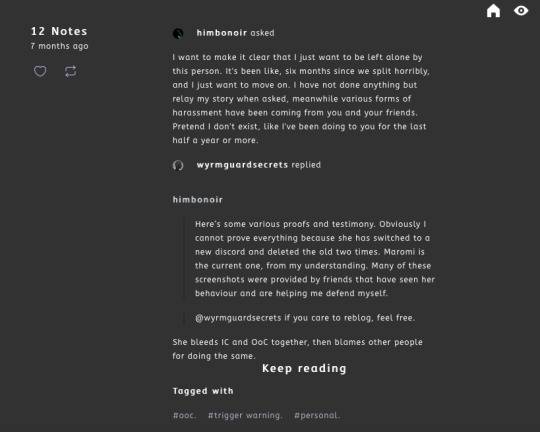
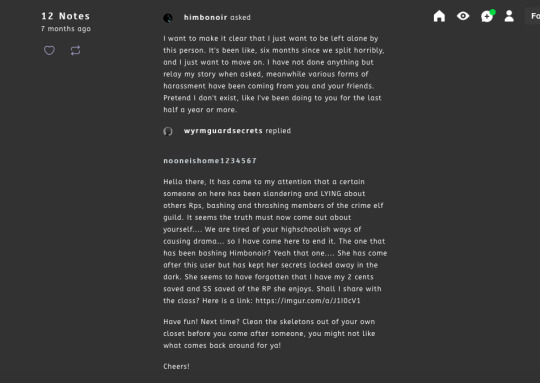
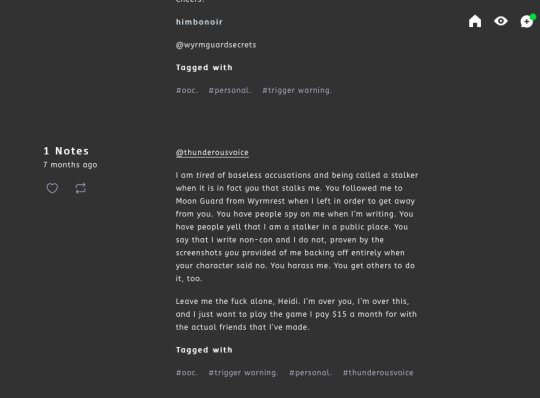
I'm not sure if the two of these people are the best source of information regarding a situation involving accusations, as it seems like they are involved in drama consistently even now.
below is one of the first moments that Talia began talking to Nova again, discussing how to move forward. discourse in mutual friends aside, the two seemed to be friends but there was some discomfort there. that's fine on all sides, seems like a healthy interaction to me. nova owns up to things and apologizes and gives Talia space to process.

The claim about the tickets: the reddit post left out a part. It's also come to my attention she changed her flight and saw another friend instead. 'that's not the way that works' is a fair statement about a non-refundable ticket. it is in fact the case.

i'm not saying believe one side or the other, however there was some additional info we had that we wanted to bring to light in light of the new addition, in order to give people a more rounded view of the story. however while you can draw your own conclusions, you cannot know for sure what someone's intentions were unless you wish to ask them about it yourselves to do your own research. on our side it seems like the history of narrative twisting and drama has been on the Talia/Djaq side of things.
Talia mentioned guilt tripping in the post, however. again, if we aren't involved we can't say what the intentions were. however it seemed short and sweet. here's a screenshot illustrating the picture a bit more clearly. Nova mentions that Talia's comfort comes first, and says that she can do what she needs to do for her own comfort. also that she wishes nothing but the best for Talia.

but again, draw your own conclusions! have a good day.
although please know we are dedicated to fact-checking, as with the post below.
0 notes
Text
fan language: the victorian imaginary and cnovel fandom
there’s this pinterest image i’ve seen circulating a lot in the past year i’ve been on fandom social media. it’s a drawn infographic of a, i guess, asian-looking woman holding a fan in different places relative to her face to show what the graphic helpfully calls “the language of the fan.”
people like sharing it. they like thinking about what nefarious ancient chinese hanky code shenanigans their favorite fan-toting character might get up to—accidentally or on purpose. and what’s the problem with that?
the problem is that fan language isn’t chinese. it’s victorian. and even then, it’s not really quite victorian at all.
--------------------
fans served a primarily utilitarian purpose throughout chinese history. of course, most of the surviving fans we see—and the types of fans we tend to care about—are closer to art pieces. but realistically speaking, the majority of fans were made of cheaper material for more mundane purposes. in china, just like all around the world, people fanned themselves. it got hot!
so here’s a big tipoff. it would be very difficult to use a fan if you had an elaborate language centered around fanning yourself.
you might argue that fine, everyday working people didn’t have a fan language. but wealthy people might have had one. the problem we encounter here is that fans weren’t really gendered. (caveat here that certain types of fans were more popular with women. however, those tended to be the round silk fans, ones that bear no resemblance to the folding fans in the graphic). no disrespect to the gnc old man fuckers in the crowd, but this language isn’t quite masc enough for a tool that someone’s dad might regularly use.
folding fans, we know, reached europe in the 17th century and gained immense popularity in the 18th. it was there that fans began to take on a gendered quality. ariel beaujot describes in their 2012 victorian fashion accessories how middle class women, in the midst of a top shortage, found themselves clutching fans in hopes of securing a husband.
she quotes an article from the illustrated london news, suggesting “women ‘not only’ used fans to ‘move the air and cool themselves but also to express their sentiments.’” general wisdom was that the movement of the fan was sufficiently expressive that it augmented a woman’s displays of emotion. and of course, the more english audiences became aware that it might do so, the more they might use their fans purposefully in that way.
notice, however, that this is no more codified than body language in general is. it turns out that “the language of the fan” was actually created by fan manufacturers at the turn of the 20th century—hundreds of years after their arrival in europe—to sell more fans. i’m not even kidding right now. the story goes that it was louis duvelleroy of the maison duvelleroy who decided to include pamphlets on the language with each fan sold.
interestingly enough, beaujot suggests that it didn’t really matter what each particular fan sign meant. gentlemen could tell when they were being flirted with. as it happens, meaningful eye contact and a light flutter near the face may be a lingua franca.
so it seems then, the language of the fan is merely part of this victorian imaginary we collectively have today, which in turn itself was itself captivated by china.
--------------------
victorian references come up perhaps unexpectedly often in cnovel fandom, most often with regards to modesty.
it’s a bit of an awkward reference considering that chinese traditional fashion—and the ambiguous time periods in which these novels are set—far predate victorian england. it is even more awkward considering that victoria and her covered ankles did um. imperialize china.
but nonetheless, it is common. and to make a point about how ubiquitous it is, here is a link to the twitter search for “sqq victorian.” sqq is the fandom abbreviation for shen qingqiu, the main character of the scum villain’s self-saving system, by the way.
this is an awful lot of results for a search involving a chinese man who spends the entire novel in either real modern-day china or fantasy ancient china. that’s all i’m going to say on the matter, without referencing any specific tweet.
i think people are aware of the anachronism. and i think they don’t mind. even the most cursory research reveals that fan language is european and a revisionist fantasy. wikipedia can tell us this—i checked!
but it doesn’t matter to me whether people are trying to make an internally consistent canon compliant claim, or whether they’re just free associating between fan facts they know. it is, instead, more interesting to me that people consistently refer to this particular bit of history. and that’s what i want to talk about today—the relationship of fandom today to this two hundred odd year span of time in england (roughly stuart to victorian times) and england in that time period to its contemporaneous china.
things will slip a little here. victorian has expanded in timeframe, if only because random guys posting online do not care overly much for respect for the intricacies of british history. china has expanded in geographic location, if only because the english of the time themselves conflated china with all of asia.
in addition, note that i am critiquing a certain perspective on the topic. this is why i write about fan as white here—not because all fans are white—but because the tendencies i’m examining have a clear historical antecedent in whiteness that shapes how white fans encounter these novels.
i’m sure some fans of color participate in these practices. however i don’t really care about that. they are not its main perpetrators nor its main beneficiaries. so personally i am minding my own business on that front.
it’s instead important to me to illuminate the linkage between white as subject and chinese as object in history and in the present that i do argue that fannish products today are built upon.
--------------------
it’s not radical, or even new at all, for white audiences to consume—or create their own versions of—chinese art en masse. in many ways the white creators who appear to owe their whole style and aesthetic to their asian peers in turn are just the new chinoiserie.
this is not to say that white people can’t create asian-inspired art. but rather, i am asking you to sit with the discomfort that you may not like the artistic company you keep in the broader view of history, and to consider together what is to be done about that.
now, when i say the new chinoiserie, i first want to establish what the original one is. chinoiserie was a european artistic movement that appeared coincident with the rise in popularity of folding fans that i described above. this is not by coincidence; the european demand for asian imports and the eventual production of lookalikes is the movement itself. so: when we talk about fans, when we talk about china (porcelain), when we talk about tea in england—we are talking about the legacy of chinoiserie.
there are a couple things i want to note here. while english people as a whole had a very tenuous knowledge of what china might be, their appetites for chinoiserie were roughly coincident with national relations with china. as the relationship between england and china moved from trade to out-and-out wars, chinoiserie declined in popularity until china had been safely subjugated once more by the end of the 19th century.
the second thing i want to note on the subject that contrary to what one might think at first, the appeal of chinoiserie was not that it was foreign. eugenia zuroski’s 2013 taste for china examines 18th century english literature and its descriptions of the according material culture with the lens that chinese imports might be formative to english identity, rather than antithetical to it.
beyond that bare thesis, i think it’s also worthwhile to extend her insight that material objects become animated by the literary viewpoints on them. this is true, both in a limited general sense as well as in the sense that english thinkers of the time self-consciously articulated this viewpoint. consider the quote from the illustrated london news above—your fan, that object, says something about you. and not only that, but the objects you surround yourself with ought to.
it’s a bit circular, the idea that written material says that you should allow written material to shape your understanding of physical objects. but it’s both 1) what happened, and 2) integral, i think, to integrating a fannish perspective into the topic.
--------------------
japanning is the name for the popular imitative lacquering that english craftspeople developed in domestic response to the demand for lacquerware imports. in the eighteenth century, japanning became an artform especially suited for young women. manuals were published on the subject, urging young women to learn how to paint furniture and other surfaces, encouraging them to rework the designs provided in the text.
it was considered a beneficial activity for them; zuroski describes how it was “associated with commerce and connoisseurship, practical skill and aesthetic judgment.” a skillful japanner, rather than simply obscuring what lay underneath the lacquer, displayed their superior judgment in how they chose to arrange these new canonical figures and effects in a tasteful way to bring out the best qualities of them.
zuroski quotes the first english-language manual on the subject, written in 1688, which explains how japanning allows one to:
alter and correct, take out a piece from one, add a fragment to the next, and make an entire garment compleat in all its parts, though tis wrought out of never so many disagreeing patterns.
this language evokes a very different, very modern practice. it is this english reworking of an asian artform that i think the parallels are most obvious.
white people, through their artistic investment in chinese material objects and aesthetics, integrated them into their own subjectivity. these practices came to say something about the people who participated in them, in a way that had little to do with the country itself. their relationship changed from being a “consumer” of chinese objects to becoming the proprietor of these new aesthetic signifiers.
--------------------
i want to talk about this through a few pairs of tensions on the subject that i think characterize common attitudes then and now.
first, consider the relationship between the self and the other: the chinese object as something that is very familiar to you, speaking to something about your own self vs. the chinese object as something that is fundamentally different from you and unknowable to you.
consider: [insert character name] is just like me. he would no doubt like the same things i like, consume the same cultural products. we are the same in some meaningful way vs. the fast standard fic disclaimer that “i tried my best when writing this fic, but i’m a english-speaking westerner, and i’m just writing this for fun so...... [excuses and alterations the person has chosen to make in this light],” going hand-in-hand with a preoccupation with authenticity or even overreliance on the unpaid labor of chinese friends and acquaintances.
consider: hugh honour when he quotes a man from the 1640s claiming “chinoiserie of this even more hybrid kind had become so far removed from genuine Chinese tradition that it was exported from India to China as a novelty to the Chinese themselves”
these tensions coexist, and look how they have been resolved.
second, consider what we vest in objects themselves: beaujot explains how the fan became a sexualized, coquettish object in the hands of a british woman, but was used to great effect in gilbert and sullivan’s 1885 mikado to demonstrate the docility of asian women.
consider: these characters became expressions of your sexual desires and fetishes, even as their 5’10 actors themselves are emasculated.
what is liberating for one necessitates the subjugation and fetishization of the other.
third, consider reactions to the practice: enjoyment of chinese objects as a sign of your cosmopolitan palate vs “so what’s the hype about those ancient chinese gays” pop culture explainers that addressed the unconvinced mainstream.
consider: zuroski describes how both english consumers purchased china in droves, and contemporary publications reported on them. how:
It was in the pages of these papers that the growing popularity of Chinese things in the early eighteenth century acquired the reputation of a “craze”; they portrayed china fanatics as flawed, fragile, and unreliable characters, and frequently cast chinoiserie itself in the same light.
referenda on fannish behavior serve as referenda on the objects of their devotion, and vice versa. as the difference between identity and fetish collapses, they come to be treated as one and the same by not just participants but their observers.
at what point does mxtx fic cease to be chinese?
--------------------
finally, it seems readily apparent that attitudes towards chinese objects may in fact have something to do with attitudes about china as a country. i do not want to suggest that these literary concerns are primarily motivated and begot by forces entirely divorced from the real mechanics of power.
here, i want to bring in edward said, and his 1993 culture and imperialism. there, he explains how power and legitimacy go hand in hand. one is direct, and one is purely cultural. he originally wrote this in response to the outsize impact that british novelists have had in the maintenance of empire and throughout decolonization. literature, he argues, gives rise to powerful narratives that constrain our ability to think outside of them.
there’s a little bit of an inversion at play here. these are chinese novels, actually. but they’re being transformed by white narratives and artists. and just as i think the form of the novel is important to said’s critique, i think there’s something to be said about the form that fic takes and how it legitimates itself.
bound up in fandom is the idea that you have a right to create and transform as you please. it is a nice idea, but it is one that is directed towards a certain kind of asymmetry. that is, one where the author has all the power. this is the narrative we hear a lot in the history of fandom—litigious authors and plucky fans, fanspaces always under attack from corporate sanitization.
meanwhile, said builds upon raymond schwab’s narrative of cultural exchange between european writers and cultural products outside the imperial core. said explains that fundamental to these two great borrowings (from greek classics and, in the so-called “oriental renaissance” of the late 18th, early 19th centuries from “india, china, japan, persia, and islam”) is asymmetry.
he had argued prior, in orientalism, that any “cultural exchange” between “partners conscious of inequality” always results in the suffering of the people. and here, he describes how “texts by dead people were read, appreciated, and appropriated” without the presence of any actual living people in that tradition.
i will not understate that there is a certain economic dynamic complicating this particular fannish asymmetry. mxtx has profited materially from the success of her works, most fans will not. also secondly, mxtx is um. not dead. LMAO.
but first, the international dynamic of extraction that said described is still present. i do not want to get overly into white attitudes towards china in this post, because i am already thoroughly derailed, but i do believe that they structure how white cnovel fandom encounters this texts.
at any rate, any profit she receives is overwhelmingly due to her domestic popularity, not her international popularity. (i say this because many of her international fans have never given her a cent. in fact, most of them have no real way to.) and moreover, as we talk about the structure of english-language fandom, what does it mean to create chinese cultural products without chinese people?
as white people take ownership over their versions of stories, do we lose something? what narratives about engagement with cnovels might exist outside of the form of classic fandom?
i think a lot of people get the relationship between ideas (the superstructure) and production (the base) confused. oftentimes they will lob in response to criticism, that look! this fic, this fandom, these people are so niche, and so underrepresented in mainstream culture, that their effects are marginal. i am not arguing that anyone’s cql fic causes imperialism. (unless you’re really annoying. then it’s anyone’s game)
i’m instead arguing something a little bit different. i think, given similar inputs, you tend to get similar outputs. i think we live in the world that imperialism built, and we have clear historical predecessors in terms of white appetites for creating, consuming, and transforming chinese objects.
we have already seen, in the case of the fan language meme that began this post, that sometimes we even prefer this white chinoiserie. after all, isn’t it beautiful, too?
i want to bring discomfort to this topic. i want to reject the paradigm of white subject and chinese object; in fact, here in this essay, i have tried to reverse it.
if you are taken aback by the comparisons i make here, how can you make meaningful changes to your fannish practice to address it?
--------------------
some concluding thoughts on the matter, because i don’t like being misunderstood!
i am not claiming white fans cannot create fanworks of cnovels or be inspired by asian art or artists. this essay is meant to elaborate on the historical connection between victorian england and cnovel characters and fandom that others have already popularized.
i don’t think people who make victorian jokes are inherently bad or racist. i am encouraging people to think about why we might make them and/or share them
the connections here are meant to be more provocative than strictly literal. (e.g. i don’t literally think writing fanfic is a 1-1 descendant of japanning). these connections are instead meant to 1) make visible the baggage that fans of color often approach fandom with and 2) recontextualize and defamiliarize fannish practice for the purposes of honest critique
please don’t turn this post into being about other different kinds of discourse, or into something that only one “kind” of fan does. please take my words at face value and consider them in good faith. i would really appreciate that.
please feel free to ask me to clarify any statements or supply more in-depth sources :)
1K notes
·
View notes
Text
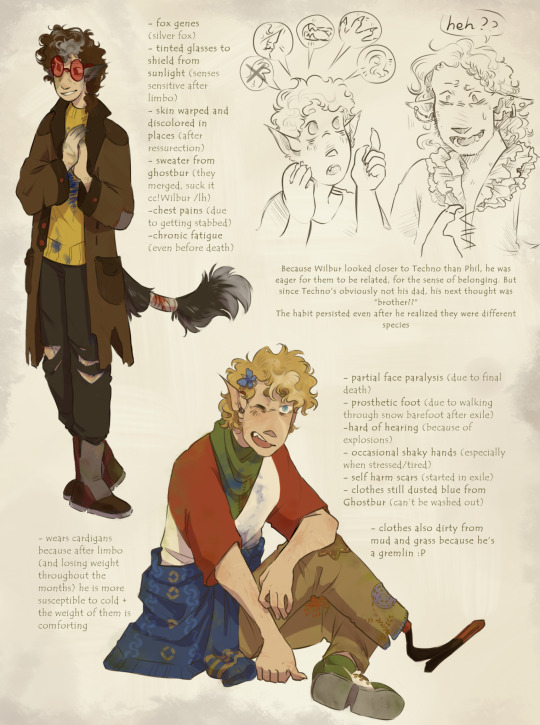
I've been thinking about headcanons and reworking my designs lately, so here's my latest take on c!crime boys ^^ Credit for the idea of c!Tommy having face paralysis goes to @ghostly-tart btw!
Oh, also, forgot to write this point, but c!Wilbur no longer wears a beanie because he likes to feel the sun in his hair ^^
ID (with the text, in case you can't read it in the image) under cut, since it's kinda long:
[ID: full body, colored illustrations of character Tommyinnit and Wilbur Soot from the Dream SMP. The background looks like old paper, and there is text placed beside the art.
Wilbur is a pale, tall man with curly brown hair that has a streak of grey. He is wearing a yellow sweater that has blue stiches in the chest area and that has blotches of the same blue on it like paint. He's also wearing a worn, brown trench coat, and ripped black plants. His skin has streaks of green and red, like a zombie, and his ears are furry and gray, like a fox's, along with a fluffy tail, which has a bloody bandage wrapped around a part of it.
The text says:
Fox genes (silver fox)
Tinted glasses to shield from the sunlight (senses sensitive after limbo)
Skin warped and discolored in places (after ressurection)
Sweater from Ghostbur (they merged, suck it cc!Wilbur /lighthearted)
Chest pains (due to getting stabbed)
Chronic fatigue (even before death)
Next to this is an uncolored doodle of young Wilbur and human Technoblade. Wilbur is looking up at the man with wonder, one hand reaching towards his ear and the other pointing at Techno as he speaks. The speech bubbles above him show a series of appendages - a wing being crossed out, sharp ears, sharp teeth, sharp claws and a tail. Techno, who is bulky, has sharp ears with various gold earrings, tusks, long curly hair, and sharp claws, is pointing to himself and looking down at Wilbur with confusion and discomfort, saying "heh??".
The text says:
Because Wilbur looked closer to Techno than Phil, he was eager for them to be related, for the sense of belonging. But since Techno's obviously not his dad, his next thought was "Brother??".
The habit persisted even after he realized they were different species.
Tommy is a blonde teen with a streak of white and a blue butterfly clip in his hair. He has a red and white baseball t-shirt, a green bandana around his neck, and a blue wool cardigan tied around his middle. The cardigan has simple lighter blue and gold patterns on it. His khaki pants have patches and stitches as visible mending. His clothes are dirty, and he has the same blue stains as on Wilbur on his shirt and bandana. His left foot is prosthetic. He has sharp ears, with a hearing aid in the right one, and his skin has various scarring - from a big, old scar on his left cheek, to faded burn scars on his other cheek, arms and fingers, to many faded cuts on the underside of his arms. Though the left side of his face is limp and expressionless, he looks happy.
The text says:
Partial face paralysis (from his final death)
Prosthetic foot (from walking through the snow barefoot after exile)
Hard of hearing (because of explosions)
Occasional shaky hands (especially when stressed/tired)
Self harm scars (started in exile)
Clothes still dusted blue from Ghostbur (can't be washed out)
Clothes also dirty from mud and grass because he's a gremlin :P
Wears cardigans because after limbo (and losing weight throughout the months) he is more susceptiple to cold + the weight of them is comforting. End ID.]
#tommyinnit#wilbur soot#crime boys#tommyinnit fanart#wilbur soot fanart#dream smp#dream smp fanart#art#headcanons#disability headcanon#self harm mention tw#self harm tw#blood tw#scars tw#death mention tw#technoblade#my own art#my own post#could wilbur have gotten normal good sunglasses rather than tacky red ones? yes#but those were the first ones he could find. plus he didn't wanna ask others for better ones. plus they double as a fashion statement#and he quickly got attached :]#also i don't have most of these disabilities/traits so if i get anything wrong do tell me#btw i know c!tommy has. a lot. but hey mans been through stuff !#anyways im off to bed ciao <3
410 notes
·
View notes
Text
Generous offering
Yandere!Zhongli x gn!Fatui Harbinger!reader
Wordcount:1843
CW:Yandere themes
There are several simple things one should know before dealing with the archons - be respectful and polite, speak only when you’re allowed to and most importantly - never forget that archons aren’t humans.
The first two rules are instinctive - it’s natural for humans to simper and bow before the forces far greater than them, while the latter is not; on the contrary it’s counterintuitive and unexpected. People tend to project, tend to humanize - they see kindness when there’s none and make a huge mistake of assuming that archons see things the way they see it.
Tsaritsa, for example, lacks humanity, despite holding the title of Goddess of Love. The love that she holds for you is different from love mothers and fathers give to their children, or love that young sweethearts share at night, it’s cold and impersonal and undeniably cruel.
Tsaritsa says that she loves all of you and she loves Snezhnaya, yet she lashes out a harsh and gruelling punishments at every perceived failure and rules her land with an iron fist, one would think that the cryo archon is a liar and a hypocrite, who uses pretty, flowery words to hide the atrocities she commits, but this perspective is flawed. Tsaritsa loves all of you and she loves Snezhnaya, she’s just not human enough to properly express this.
That’s why it’s a bit jarring to see the ancient lord of these lands in his mortal form - he lacks the same otherworldly terror and grandiose that every of Tsaritsa’s move and word carry, yet he also possesses the air of wisdom and elegance so refined that rare person can reach it. It’s easy to assume that he’s human.
Rex Lapis, or “Zhongli” as he calls himself now invites you to the Liuli pavillion the second day after your arrival, for tea and local cuisine as he says, and who are you to decline a God?
Liuli staff hurries and dashes around, preparing their best room for you - Fatui are known for their seemingly endless finances, no wonder they’re in haste. “Please make yourself comfortable, dear guests”, the waiter curtsies and leads you to the dining room, which happens to be richly furnished and decorated with high-quality darkwood furniture and the hand painted wall panels further accentuating the luxury of the restaurant.
One of these panels illustrate different scenes from the Liyuen mythos - a battle of mighty and wise adepti against the horde of demons, Rex Lapis aiding his people in building the Harbour and the most spectacular one - a majestic dark brown dragon with golden fur and feathers descending to the devoted worshippers, who in turn present him with their offerings and gratitude.
He orders tea and meals for both of you, as you start to converse about the plan that he is determined to bring into life - the so-called test of Liyue, and the guarantee of you obtaining his gnosis.
“And what about your colleague?”, he sips a bit of his tea, intense amber eyes piercing right through you. He looks both human and non-human in this moment, both undeniably mortal softness and frailty seen in his figure and the barely concealed divinity, the sense of awe slowly seeping into air mixing in one person.
“And what about him? Tsaritsa and you have negotiated everything beforehand, I will make sure that he plays his part properly”, he hums at your answer, lowering his gaze deep in thought. You start on your own tea.
Ah, Childe, if only he knew why exactly he’s here - a distraction and a scapegoat. You even feel bad for him - it’s truly unfair to be lied to by your own Goddess. However, it’s also not a big surprise - Childe is the loudest out of all Harbingers in all senses. Infamous for his skills and battle obsession, his name is enough to have people both shivering in fear and cursing him.
“What do you think of your archon? Was serving her of any use to you?”Rex Lapis unexpectedly asks.
You lean back in your seat, thinking what to say.
“Tsaritsa is a gentle soul, she declared war only to protect us, her subjects and I am ready to aid her in whatever undertaking she starts”.
“Will you continue to serve Tsaritsa, if her action might put you in danger, make you suffer and bring unnecessary grief?”, he leans closer to you, his human features distorting enough to reveal the ancient dragon sleeping inside. His eyes shine a cold golden glow and accurate fingernails morph into sharp, dark claws.
“Yes”, you breathe out, mesmerized and terrified by the sudden change: “Her love knows no bounds, yet she always puts the needs of the nation before anyone else. If my suffering can help Snezhnaya, then I will accept it with open arms”, he moves back at your answer, all draconic traces gone in an instance, upper corner of his lips subtly rising - whatever you said must’ve pleased him immensely.
The conversation flows back into the territory of plans to be realized, yet the cold sensation of dread still clings to you, your gut feeling yelling at you to get up and run. You remain seated to the end of your meeting, politely conversing with the God that terrifies you.
***
Days slowly grow into weeks and Childe acts just as you have expected - the Eleventh Harbinger might be smart, yet even he wouldn’t be able to see what two of you are scheming. Still, you request Ekaterine, a spy you planted in Northland bank, to keep you updated on the Tartaglia’s actions - extra caution never hurts.
You continue to meet up with geo archon, as you two discuss your next actions. Tartaglia has started cooperating with that blonde foreigner Signora has warned you about, and while this union doesn’t pose any threat to your plans, it’s always good to have a plan B, just in case something happens.
Sometimes your conversation develops into a more unexpected direction, as you find the archaic lord more chatty and tending to ramble, than any of Liyuen historians would dare to picture him as. One on such occasion he talks with you about dragons - benevolent deities who protect and bless their people in an exchange of generous offerings.
His eyes devour you, as he retells you ancient folktales and you suppress your discomfort, preferring to attribute his honestly unnerving behaviour down to his lack of humanity - he was never human in the first place.
That’s why you also prohibit yourself from viewing him as anything but God - Rex Lapis in his “Zhongli” persona is genuinely attractive, he’s well-mannered and obviously handsome and far more knowledgeable than any mortal should be. If you didn’t know of his true nature you would have fallen for him by now - it’s hard not to.
Life, how strange that wouldn’t sound, goes as usual - you get Ekaterine’s report on what Childe’s up to and if it’s something unexpected you book a Liuli pavilion room and send an invitation to the funeral parlour consultant. You only need to wait until Childe gets desperate enough and decides to use the sigils of permission to unleash the well-awaited chaos.
This routine however is soon broken by the appearance of familiar ashy-white hair in the distance. She doesn’t wear her signature mask or dress, nor are there agents at both of her sides, yet you can still clearly recognize her. Signora leaves the Wangsheng building in haste, cape with the hood concealing most of her face and figure, except the long locks of hair, peeking from inside.
What is she doing here?
You thought that Tsaritsa sent two of her servants - Tartaglia and you, him to “test” Liyue, you to oversee the former’s actions and obtain gnosis, there’s no need to send her too.
Your mind races, as you search for a logical explanation of Signora’s presence as your memory supplies the piece of first conversation you had with “Zhongli” - could it be that Tsaritsa also sent you to play a role you have no idea of?
Cryo archon is a goddess of love and her love is cruel and unforgiving, she has sacrificed countless chess pieces before, so it wouldn’t be surprising if she did that again - you are nothing but a pawn after all, one of the tools she uses to exact her will and force her vision, all of the Harbingers are.
You want to believe that you can accept and resign to whatever hardship and fate your Goddess might subject you to. You can’t.
***
Adepti and Qixing converse at the pier of the seaport, as you hurry to the Northland Bank, a slight smile playing on your lips - Childe has finally done it - he summoned an ancient god to lure out Rex Lapis, ultimately proving that Liyue can stand without him.
There are sounds of heated argument heard when you open the building’s door and then you see it - Signora and Tartaglia exchanging barely concealed insults and “Zhongli” standing nearby.
“[Harbinger]? What are you doing here?”, the ginger shifts his gaze onto you, a rare emotion of hurt and disbelief flickering in his dead fish eyes. “Of course, Tsaritsa sent you too”, he smiles, angry and disappointed. “Seems that whole world wants to make a bad guy out of me”, he stomps out of the room, leaving you with Signora and “Zhongli”
“[Harbinger]”
“Signora'', you acknowledge each other, after she trails exiting Childe with her eyes.
“I am here to take the gnosis of Rex Lapis”, she says and you nod, accepting that your Goddess lied to you too: “Tsaritsa also asked me to give you this letter”, she extends her arm, a thick envelope with the familiar seal catching your attention.
With the trembling hands you snatch it out of her hold and almost rip the envelope - for what reason did Tsaritsa send you here?
She writes that you need to stay in Liyue for an undetermined period of time to upkeep “the agreement” made between her and Rex Lapis. You read her message silently, yet when your eyes trace over these words, the sensation of “ “Zhongli’s” eyes on you becomes ten times sharper and stifling. You don’t know what to do.
The other Harbinger leaves too, taking the gnosis with her, as “Zhongli” takes a couple of steps to you, touching your shoulder in a somewhat reassuring gesture. “[First]”, he starts, tone sympathetic and soothing. You don’t fall for it.
“You had your hand in it, didn't you?”, you hiss and accuse, throwing an angry glance at him, momentarily forgetting about the first two rules of dealing with archons.
He smiles, revealing two sharp fangs, his surprisingly scaly hands snaking around yours. “Yes”, Rex Lapis admits, and looks nothing like gentle and knowledgeable “Zhongli”. How could you forget? Archons aren’t humans, humanity is just a fancy dress they don to toy with mortals. He is the dragon, not the benevolent deity that is painted on the wall panels of Liuli pavillion, but a greedy and ancient creature, hungry for gifts and gratitude.
You are his generous offering.
#yandere genshin impact#Yandere genshin#Yandere Zhongli#Yandere Zhongli x reader#Yandere genshin impact x reader#Yandere genshin x reader#Male yandere#my writing#Yandere x reader#Male yandere x reader
486 notes
·
View notes